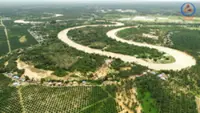KOTA KINABALU: There is a lack of transparency when it comes to the environmental impact assessment (EIA) process in some areas of Sabah, says the World Wide Fund for Nature (WWF-Malaysia).
Its associate director Dr Robecca Jumin said this hampered sustainable development practices.
As such, it was vital for improvements to be made in the EIA process and its transparency to prevent irreversible devastation to Sabah’s biodiversity, she said in a statement on Friday (April 19).
She said an EIA was necessary to gauge the significant effects of a project or development proposal on the environment and could only be truly effective when there was end-to-end transparency in the process.
"A transparent process will allow all stakeholders, including the public, to be well informed of the (implications of a project)," she said.
It would also help determine if adequate mitigating measures were being taken at every stage of the development, she added.
She said such transparency was lacking in, for example, the mining project in Bukit Mantri, Tawau.
She also said effective regulations and enforcement must be put in place to regulate mining activities so that the state’s biodiversity is not compromised.
Regulating mining activities would also be in line with the government’s intention to look into formulating responsible guidelines for mining industry as stated during WWF-Malaysia's 50th anniversary celebration in 2022, she added.
"The destructive effects of mining can derail the state government’s commitment to the protection of biodiversity.
"At best, considerations of the environment should be taken into account from the very beginning, at the prospecting stages for mining.
"We can prioritise environmental safety by avoiding environmentally sensitive areas from the get-go," said Jumin.
She cited a study which showed that coal mining expansion in East Kalimantan was the main factor driving mining-related deforestation there.
Practices such as open pit mining and cyanide heap leaching destroy landscapes and create huge amounts of toxic waste that could pollute water resources and hurt the marine ecosystem, she added.
Mining activity can increase turbidity, which is harmful to organisms like corals and seagrasses that depend on sunlight, Jumin added.
"We need only look at Mamut to see the environmental issues that mining can cause," she said.
Pollution there had caused the water to be unfit for human consumption and this was a serious issue when Sabahans already face a shortage of clean supply, she added.





